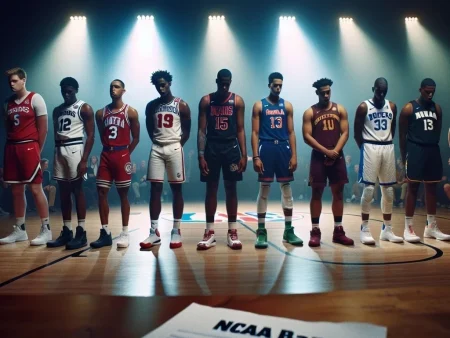Explore the evolving world of sports betting, focusing on the rise of prop bets on college athletes and the implications for gambling laws and regulations.
The Impact of Sports Betting on College Athletes and Legislative Responses
Wellcome Offer:
200% up to $2,000
+ 100 Free Spins
The winnings from your free spins will be credited as bonus funds. Exclusively available for new players with fair wagering requirements.
Wellcome Offer:
250% Bonus up to $5,000
+ 100 Free Spins
Claim your bonus and spin your way to big wins! Minimum deposit of $20 required. Wagering requirements apply. Bonus valid for 30 days.
Get up to:
100% up to $1,000
+ 300 Free Spins
You need to deposit at least $25 to be eligible for this bonus. The maximum amount of money you can withdraw from this bonus is limited to $20,000 or 10-times.
Welcome Package:
500% up to $5,000
+ 250% on your 2nd and 3rd deposits
This welcome package rewards new players across their first three deposits. A minimum deposit of $25 applies, with a wagering requirement of 60x before withdrawals.
Wellcome Offer:
250% up to $1,500
+ 100 free spins
Whether you prefer generous deposit bonuses or a bundle of free spins, Cafe Casino’s welcome offer has everything you need to enhance your gaming adventure.
Wellcome Offer:
500% bonus up to $7,500
+ 150 free spins
If you're after big deposit bonuses or a load of free spins, Ducky Luck Casino’s welcome package sets the stage for an exciting gaming adventure.
Welcome Offer:
200% up to $2,000
+ 100 Free Spins
This welcome package combines a deposit match with free spins, giving new players a powerful way to kick off their VoltageBet journey.
Wellcome Offer:
200% up to $1,000
+ 30 free spins
Lovers of slot games and those looking to boost their deposit will find Slots LV Casino’s welcome offer the perfect way to jumpstart their gaming journey.
Wellcome Offer:
200% up to $500
+ Free Spins
Terms typically include standard wagering requirements and a limited validity period. Offers vary by deposit method and player eligibility.
Wellcome Offer:
250% up to $1,500
+ 50 Free Spins
All winnings from free spins are credited as bonus funds, with fair wagering requirements. Exclusive to new players.
As the landscape of sports betting continues to evolve across the United States, the focus has shifted towards the implications of wagering on college sports, particularly with prop bets involving college athletes. This shift has prompted discussions on gambling laws and regulation, with some states considering legislative measures to protect young athletes.
The Rise of Sports Betting and Legal Framework
The legalization of sports wagering was catalyzed by a landmark decision from the Supreme Court in 2018, which overturned the Professional and Amateur Sports Protection Act (PASPA). This decision allowed states to create their own legal framework for sports betting, leading to a surge in the gaming industry. However, with the expansion of betting markets, new challenges have emerged, particularly concerning the integrity of college sports.
Prop Bets on College Athletes
Prop bets involve wagering on specific occurrences or non-occurrences within a game, such as the number of points a player will score. While popular among bettors, these bets raise ethical concerns when applied to college athletes, who are often young and not compensated like their professional counterparts. The potential for exploitation and undue pressure on these athletes has led to calls for athlete protection.
NCAA and Sports Integrity
The NCAA has long been a staunch opponent of sports gambling on college sports, citing the need to preserve sports integrity and protect student-athletes from the pressures of gambling. With the advent of widespread betting, the NCAA’s position has gained renewed attention as states assess the impact of their betting laws.
Legislative Changes and State Legislation
Some states are considering legislative changes to impose betting restrictions on college sports, particularly regarding prop bets. These changes are seen as necessary to safeguard college athletes from the potential harms of gambling. State legislation plays a crucial role in determining the extent to which betting on college sports is permissible and how athletes are protected.

Responsible Gambling and Regulation
With the proliferation of sports betting, the emphasis on responsible gambling has become more significant. Regulatory bodies are tasked with ensuring that betting practices are conducted fairly and transparently, with appropriate measures to prevent problem gambling. Effective regulation is essential to maintain public trust and protect vulnerable individuals.
Implications for the Gaming Industry
The potential ban on prop bets involving college athletes could have significant implications for the gaming industry. While such bets are lucrative, the ethical considerations and potential risks to athletes may outweigh the financial benefits. The industry must adapt to evolving regulations and prioritize the integrity of sports and the welfare of athletes.
As discussions around sports betting and college sports continue, states that have embraced gambling must carefully consider their legal framework and the impact of their laws on sports integrity. The potential ban on prop bets for college athletes highlights the need for balanced regulation that promotes responsible gambling while ensuring the protection of young athletes. Such measures are crucial for maintaining the integrity of collegiate sports and fostering a safe environment for all participants.

























